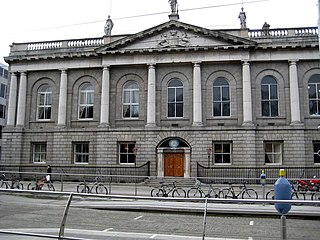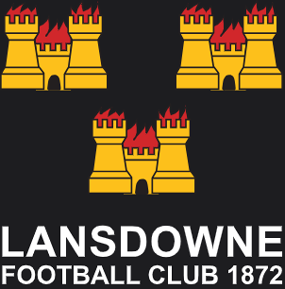
The Royal College of Surgeons in Ireland (RCSI) is a not-for-profit medical professional and educational institution, which is also known as RCSI University of Medicine and Health Sciences. It was established in 1784 as the national body for the surgical branch of medicine in Ireland, with a role in supervision of training, and as of 2021 provides a broad range of medical education in multiple countries.

The Leinster Schools Senior Challenge Cup is the premier rugby union competition for secondary schools affiliated to the Leinster Branch of the Irish Rugby Football Union (IRFU), and was first held in 1887.

Shane Patrick Horgan is an Irish former rugby union player who played wing or centre for Leinster and Ireland.

Christian Brothers College, Monkstown Park is a private fee-paying Catholic school and Independent Junior school, founded in 1856 in Monkstown, Dún Laoghaire, County Dublin, Ireland. The college arrived at Monkstown Park in 1950 from Eblana Avenue in Dún Laoghaire via a short stint on Tivoli Road. As of September 2022, it was in its 73rd academic year of existence at Monkstown Park, the 165th overall.
The Leinster Senior Cup is a major rugby competition in Ireland, involving all senior rugby clubs in Leinster, i.e., clubs from Leinster competing in the All-Ireland League. From 2006 until 2016 it was known as the Leinster Senior League Cup during the period when the Leinster Senior League had been discontinued, but reverted to its traditional name for the 2016–17 season upon the revival of the Senior League. From 2011 to 2016 only the top senior teams competed and those in the lower divisions of the All-Ireland League competed for the Leinster Senior League Shield.

Rugby union is a popular team sport on the island of Ireland, organised on an all-Ireland basis, including players and teams from both the Republic of Ireland and Northern Ireland. Its governing body, the Irish Rugby Football Union (IRFU), was founded in 1875, making it the third oldest rugby union in the world after the RFU (England) and the SRU (Scotland), which were both founded in 1871.

Lansdowne Football Club, is a rugby union team based in Dublin, Ireland. Called Football Club instead of Rugby Football Club due to being founded before the formation of the IRFU. It was founded in 1872 by Henry Dunlop as the Irish Champion Athletic Club. Its senior team currently plays in Division 1A of the All-Ireland League. The club's playing colours are black, red and yellow hoops, with navy shorts.
The Leinster Senior League, inaugurated in 1971–72, is a rugby union competition for senior clubs in the Irish province of Leinster. It has traditionally been ranked second in importance to the Leinster Senior Cup. It declined in importance due to the formation of the All-Ireland League and growth in importance of the Heineken Cup and was eventually merged with the Senior Cup, sometime before 2006, before being revived in 2016.

The UCD School of Medicine at University College Dublin, Ireland, was founded in 1854. At undergraduate level, the school offers programmes in Medicine MB BCh BAO, BSc Biomedical Health and Life Sciences, and the BSc Radiography. At graduate level, the school UCD offers over 40 programmes for health care professionals.

Beaumont Hospital is a large teaching hospital located in Beaumont, Dublin, Ireland. It is managed by RCSI Hospitals - one of the hospital groups established by the Health Service Executive. Its academic partner is the Royal College of Surgeons in Ireland.

Ernest Cotton Deane was a medical officer of the British Indian Army and an Irish international rugby player. Born in the city of Limerick, Ireland, he went to school in Kingstown in County Dublin and then studied medicine at the Royal College of Surgeons in Ireland (RCSI), graduating in 1909. He was selected to play rugby for Ireland in one match, against England in February 1909. His rugby career was cut short when he broke his leg in a match against Oxford University.

Lawrence 'Larry' Quinlivan Bulger was an Irish rugby union player, athlete and doctor. Bulger played international rugby for Ireland and in 1896 was chosen to represent a British Isles XV in their tour of South Africa. Bulger, who was nicknamed "Fat Cupid", was described as an elusive runner and a devastating tackler, one of Ireland's outstanding players.
Professor John David Henry Widdess (1906–1982) was an Irish biologist and librarian who was recognized as Ireland's foremost medical historian. His historical publications included books on the histories of institutions such as the Royal College of Surgeons in Ireland (RCSI), the Royal College of Physicians of Ireland (RCPI), and several hospitals. In 1960, he was appointed a professor of biology in RCSI, having been a lecturer and assistant in the physiology department and librarian of the college previously. In 1973, he was awarded the Abraham Colles medal of RCSI, he became an honorary fellow of RCSI and RCPI in 1975 and 1968.
The All-Ireland Cup, also known as the Bateman Cup, is a knock-out competition for the winners of the four provincial rugby union cups in Ireland.

Victoria Coffey was an Irish medical doctor and paediatrician. She was one of the first people to research sudden infant death syndrome (SIDS) and one of the first females to undertake significant research into congenital abnormalities. She also became the first female president of the Irish Paediatric Association, the paediatric section of the Royal Academy of Medicine in Ireland, the Royal College of Surgeons of Ireland (RCSI) Post-graduate Association, and the Irish American Pediatric Association. Coffey was also the first female recipient of the RCSI Distinguished Graduate medal.
Morgan Patrick Crowe was a rugby union centre who played thirteen times for Ireland between 1929–34. He played his club rugby for Leicester Tigers and Lansdowne.

Andrew Ellis was the president of the Royal College of Surgeons in Ireland (RCSI) in 1849.

Terence John MillinFRCSI FRCS LRCP was a British-born Irish urological surgeon, who in 1945, introduced a surgical treatment of benign large prostates using the retropubic prostatectomy, later known as the Millin's prostatectomy, where he approached the prostate from behind the pubic bone and through the prostatic capsule, removing the prostate through the retropubic space and hence avoided cutting into the bladder. It superseded the technique of transvesical prostatectomy used by Peter Freyer, where the prostate was removed through the bladder.
Conleth Francis Patrick Feighery is an Irish professor of immunology and former rugby union international of the 1970s. He is a Fellow Emeritus at Trinity College Dublin.
 Ireland Internationals
Ireland Internationals England Internationals
England Internationals Romania Internationals
Romania Internationals South Africa Internationals
South Africa Internationals United States Internationals
United States Internationals











